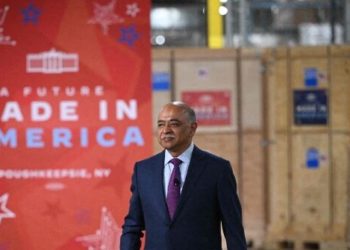The United Nations criticized Israel for its ban on humanitarian aid entering the Gaza Strip in hearings that began on Monday in the International Court of Justice, the U.N.’s highest court. Israel, which did not send a legal delegation to the hearings, rejected the proceedings as biased.
For more than a month and a half, Israel has blocked food, medicine and other relief from entering the devastated Gaza Strip in an attempt to pressure Hamas to free the dozens of remaining Israeli hostages there. It argues that its blockade is lawful and that Gaza has enough provisions despite the restrictions.
The United Nations and aid groups say the blockade has further harmed Palestinians already reeling from more than a year and a half of war in Gaza, which has killed tens of thousands of people, displaced well over a million and leveled large swaths of the enclave’s cities.
During the two-month cease-fire that began in early January, aid had begun to flow into Gaza, providing a modicum of relief. But the blockade — which began in early March — continued after the truce ended with an Israeli bombardment and widening ground assaults against Hamas.
“No humanitarian aid or commercial goods have been allowed into Gaza since 2nd of March, which has devastating humanitarian consequences in the Gaza Strip,” Elinor Hammarskjöld, the U.N.’s top lawyer, told the court on the first day of five days of hearings.
The U.N. General Assembly requested in December that the International Court of Justice, also known as the World Court, issue an advisory opinion on Israel’s obligations to allow the United Nations and other third parties to provide humanitarian assistance for Palestinians. Some 40 governments are expected to speak during the hearings. An opinion is not expected for some time.
The court’s opinion, while not binding, carries symbolic weight and could affect other governments’ policies toward Israel. U.N. officials hope the World Court will criticize Israel’s legislation banning UNRWA, the main U.N. agency that aids Palestinians.
The relationship between Israel and the United Nations — already fraught with mutual recrimination —- has nose-dived since the beginning of the war. U.N. officials and institutions have excoriated Israeli policies publicly and repeatedly. Israel has accused the United Nations of bias and claim that UNRWA is infiltrated by Hamas and its allies.
UNRWA fired several employees accused of taking part in the Hamas-led Oct. 7, 2023, attacks that ignited the war, while clearing others.
The hearings were the latest blows to Israel in international legal institutions amid Israel’s campaign against Hamas in Gaza. About 1,200 people were killed and 250 taken hostage in the October 2023 Hamas-led attack on southern Israel. Israel’s subsequent offensive against Hamas has killed more than 50,000 people, according to Palestinian health officials, who do not distinguish between civilians and combatants.
Last year, the World Court held multiple hearings on a petition by South Africa that Israel was committing genocide in the Gaza Strip. Israel strongly rejects the accusation, arguing that it has been fighting in accordance with international humanitarian law and that all decisions are carefully overseen by military advisers.
The World Court’s justices have yet to rule on the matter, but they did issue an injunction in May ordering Israel to at least partially rein in its military operations in the southern Gaza city of Rafah. Israeli forces ultimately seized control of Rafah, leveling much of the city.
Benjamin Netanyahu, the Israeli prime minister, as well as Yoav Gallant, the former defense minister, also face outstanding arrest warrants from the International Criminal Court, a separate international legal body. Karim Khan, the court’s prosecutor, also asked for warrants against three Hamas leaders, all of whom were ultimately killed by Israel.
In a news conference on Monday, Gideon Saar, the Israeli foreign minister, sought to rebuff accusations that Israel was violating its obligations under international law. “This case is part of a systematic persecution and delegitimization of Israel,” he said.
Ordinary Gazans have lamented the rising price of basic commodities under the pressure of the blockade. In some cases, the restrictions have turned the quest for getting enough nutritious food into a daily struggle.
During the cease-fire, many Gazans were finally able to purchase meat and fresh vegetables flowing in from outside the enclave. But with the crossings now shuttered, the price of flood — including basic stables — has risen dramatically, according to several Palestinians in central and southern Gaza.
Maher Ghanem, a resident of the central Gaza city of Deir al-Balah, described spending his days waiting in lines at the charity kitchens run by aid groups or scanning markets for whatever food he could afford.
“What we’re going through in Gaza can’t be called life,” he said.
Marlise Simons contributed reporting.
Aaron Boxerman is a Times reporter covering Israel and Gaza. He is based in Jerusalem.
The post Israel Faces World Court Hearings Over Gaza Aid appeared first on New York Times.




